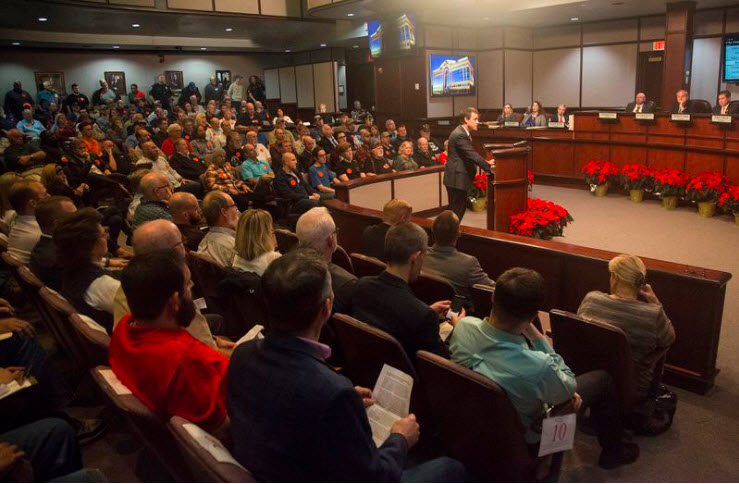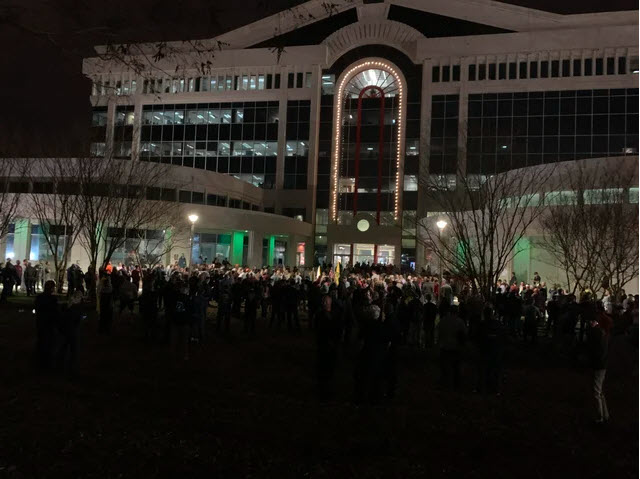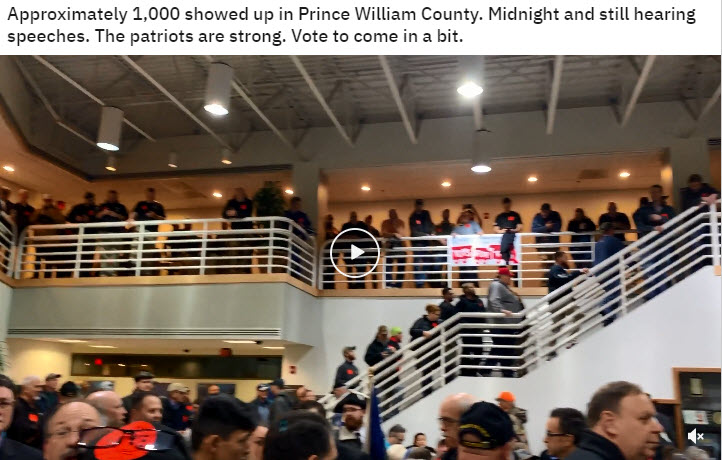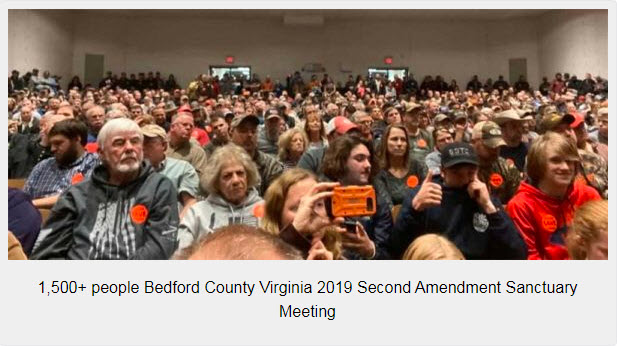Virginia House Bill No. 67 is very interesting.
HOUSE BILL NO. 67Offered January 8, 2020Prefiled December 5, 2019A BILL to amend and reenact §§ 40.1-55 through 40.1-57.1 and 40.1-58.1 of the Code of Virginia, relating to strikes by certain government employees.
———-Patron– Carter———-Committee Referral Pending———-Be it enacted by the General Assembly of Virginia:
1. That §§ 40.1-55 through 40.1-57.1 and 40.1-58.1 of the Code of Virginia are amended and reenacted as follows:
§ 40.1-55. Public safety employee striking terminates, and becomes temporarily ineligible for, public employment.
A. As used in this article, “public safety employee” means any law-enforcement officer, as defined in § 9.1-500.
B. Any public safety employee of the Commonwealth, or of any county, city, town or other political subdivision thereof, or of any agency of any one of them, who, in concert with two or more other such employees, for the purpose of obstructing, impeding or suspending any activity or operation of his employing agency or any other governmental agency, strikes or willfully refuses to perform the duties of his employment shall, by such action, be deemed to have terminated his employment and shall thereafter be ineligible for employment in any position or capacity during the next twelve 12 months by the Commonwealth, or any county, city, town or other political subdivision of the Commonwealth, or by any department or agency of any of them.
§ 40.1-56. Department head, etc., to notify public safety employee of such termination, etc.
In any such case the head of any department of the state government, or the mayor of any city or town, or the chairman of the board of supervisors or other governing body of any county, or the head of any other such employing agency, in which such a public safety employee whose employment was terminated pursuant to § 40.1-55 was employed, shall forthwith notify such public safety employee of the fact of the termination of his employment and at the same time serve upon him in person or by registered mail a declaration of his ineligibility for reemployment as before provided. Such declaration shall state the fact upon which the asserted ineligibility is based.
§ 40.1-57. Appeal by public safety employee from declaration of ineligibility.
In the event that any such public safety employee whose employment was terminated pursuant to § 40.1-55 feels aggrieved by such declaration of ineligibility he may within ninety 90 days after the date thereof appeal to the circuit court of the county or the circuit court of the city in which he was employed by filing a petition therein for a review of the matters of law and fact involved in or pertinent to the declaration of ineligibility. A copy of the petition shall be served upon or sent by registered mail to the official signing the declaration, who may file an answer thereto within ten 10 days after receiving the same. The court or the judge thereof in vacation shall, as promptly as practicable, hear the appeal de novo and notify the employee and the signer of the declaration of ineligibility of the time and place of hearing. The court shall hear such testimony as may be adduced by the respective parties and render judgment in accordance with the law and the evidence. Such judgment shall be final.
§ 40.1-57.1. Appeal by employer for reemployment of terminated public safety employee.
Notwithstanding any provision of law to the contrary, in the event that the employer of an individual terminated under this article deems it necessary for the protection of the public welfare that such individual be reemployed within the twelve 12 months following his termination, the employer may, within ninety 90 days after the date of the declaration of ineligibility, appeal to the circuit court of the county or the circuit court of the city in which the individual was employed by filing a petition therein setting forth the reasons why the public welfare requires reemployment. A copy of the petition shall be served upon or sent by registered mail to the former public safety employee, who may file an answer therein ten 10 days after receiving the same. The court or the judge thereof in vacation shall notify the employer and former public safety employee of the time and place of the hearing on the appeal, such hearing to be de novo and to be held as promptly as possible. The court shall hear such testimony as may be adduced by the respective parties and render judgment in accordance with the law and the evidence. Such judgment shall be final.
§ 40.1-58.1. Application of article to public employers and public safety employees.
As used in this article, the words, “person,” “persons,” “employer,” “employees,” “union,” “labor union,” “association,” “organization,” and “corporation” shall include but not be limited to public employers, public employees, and any representative of public employees in this the Commonwealth. The application of this article to public employers, public employees, and their representatives shall not be construed as modifying in any way the application of § 40.1-55 to government public safety employees as defined in such section.
To begin with our analysis, let’s make it clear that this reenacts an existing law, while also amending that existing law. And just to make it clear (it’s a shame we have to do this, but in order to placate other bloggers who might get their panties all wadded up), there are strike-throughs, italics and existing laws that need to be fisked in order to understand what they’re proposing.
If one reads the existing law in 40.1-55, it currently says the following.
Any employee of the Commonwealth, or of any county, city, town or other political subdivision thereof, or of any agency of any one of them, who, in concert with two or more other such employees, for the purpose of obstructing, impeding or suspending any activity or operation of his employing agency or any other governmental agency, strikes or willfully refuses to perform the duties of his employment shall … [ bold mine].
This is being amended and reenacted (as I’ve said before, reenacting a law is slightly different than simply amending it) to read as follows, citing from above.
A. As used in this article, “public safety employee” means any law-enforcement officer, as defined in § 9.1-500.
B. Any public safety employee of the Commonwealth, or of any county, city, town or other political subdivision thereof, or of any agency of any one of them, who, in concert with two or more other such employees …
So it would appear that whereas the law once would have addressed striking state road workers, for instance, it now completely ignores them and other state employees to include only LEOs. It now says “Any employee,” and the proposal is for it to say “Any public safety employee.” This is defined as follows.
“Agency” means the Department of State Police, the Division of Capitol Police, the Virginia Marine Resources Commission, the Virginia Port Authority, the Department of Game and Inland Fisheries, the Virginia Alcoholic Beverage Control Authority, the Department of Conservation and Recreation, or the Department of Motor Vehicles; or the political subdivision or the campus police department of any public institution of higher education of the Commonwealth employing the law-enforcement officer.
“Law-enforcement officer” means any person, other than a Chief of Police or the Superintendent of the Department of State Police, who, in his official capacity, is (i) authorized by law to make arrests and (ii) a nonprobationary officer of one of the following agencies:
a. The Department of State Police, the Division of Capitol Police, the Virginia Marine Resources Commission, the Virginia Port Authority, the Department of Game and Inland Fisheries, the Virginia Alcoholic Beverage Control Authority, the Department of Motor Vehicles, or the Department of Conservation and Recreation;
b. The police department, bureau or force of any political subdivision or the campus police department of any public institution of higher education of the Commonwealth where such department, bureau or force has three or more law-enforcement officers; or
c. Any conservation police officer as defined in § 9.1-101.
For the purposes of this chapter, “law-enforcement officer” shall not include the sheriff’s department of any city or county.
This definition includes all state police, but excludes Sheriff’s departments and their deputies, perhaps because they know there is no legal basis for such an inclusion.
In any case, they appear to be frenetically searching for ways to say to their state police, “You’ll enforce our new laws, and if you don’t, we’ll take your job and future pensions away from you.”
As always, I could be wrong about this interpretation. Feel free to weigh in with comments, but until persuaded otherwise, they appear by this bill to be attempting to criminalize failure of state police agents to implement new firearms regulation, up to and including confiscatory orders. You try to get another job with “willful refusal to perform the duties of employment” on your resume.
In this case I’d be all too happy to have that conversation with prospective employers in Virginia. Then again, men with families will be much less flexible. Moral considerations will need to outweigh practical considerations, and I don’t hold out much hope of that calculus giving a good outcome with many LEOs who are agents of the state rather than deputies in counties.
If you have a different interpretation of this bill, weigh in with comments.
UPDATE: More On House Bill No. 67.








